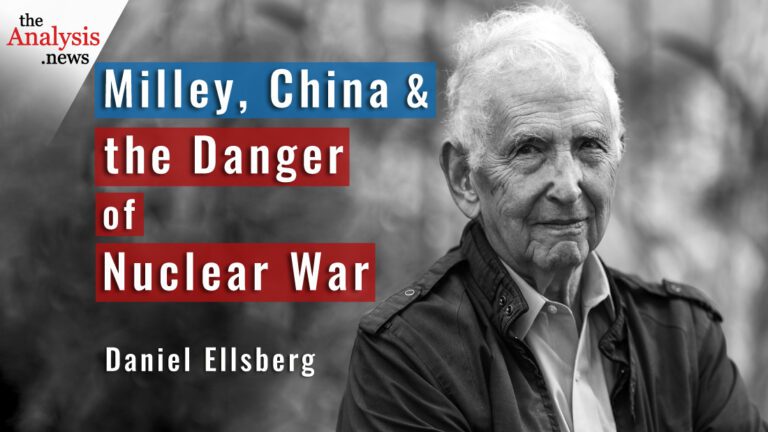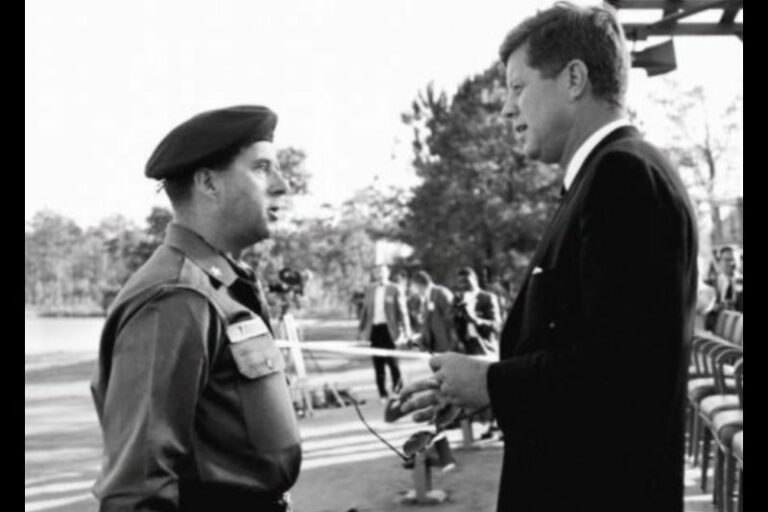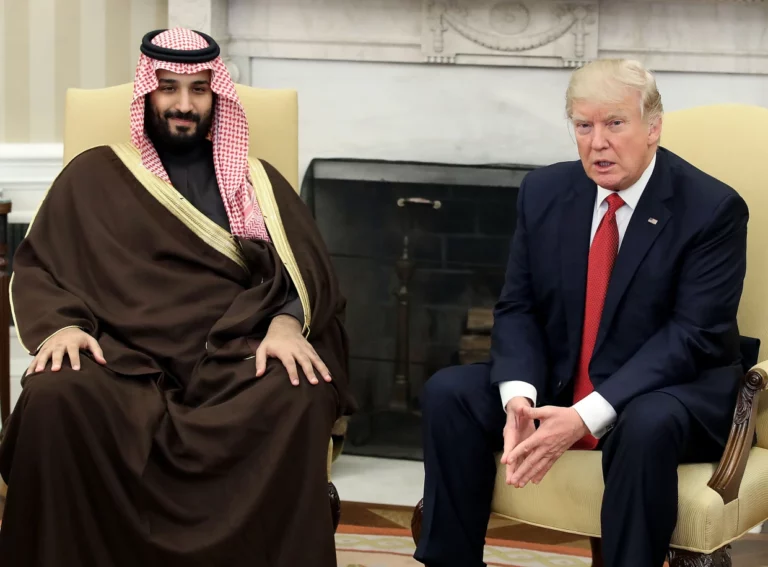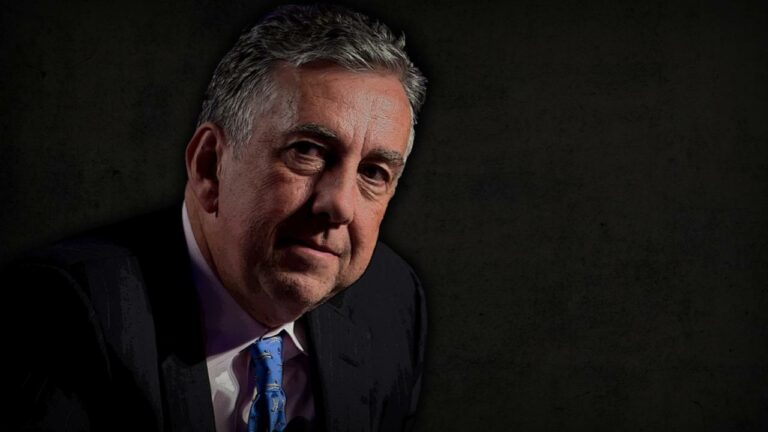This is an episode of Reality Asserts Itself, produced on June 1, 2017. On Reality Asserts Itself, Prof. Alnasseri says Trump’s strategy is to use the war against ISIS as an excuse to build up US troop levels in Iraq to control the oil and create a pro-American government.
PAUL JAY: Welcome back to Reality Asserts Itself on the Real News Network. I’m Paul Jay. We’re continuing our series with Sabah Alnasseri. Thanks for joining us again.
SABAH ALNASSERI: Pleasure.
PAUL JAY: One more time. Sabah was born in Basra, Iraq. He teaches at the political science department at York University in Toronto. His most recent book is Arab Revolutions and Beyond: The Middle East and Reverberations in the Americas.
SABAH ALNASSERI: Right.
PAUL JAY: Paint a picture of where we’re at now in Iraq. From what I know, the Americans, number one, concocted a weapons of mass destruction argument that they knew was false in order to go in. They go in, one would think, with the objective to overthrow Saddam, and put in a pro-American government, and get ahold of the oil resources. They’re successful in overthrowing Saddam. They get a government that’s almost more pro-Iranian than it is pro-American, and they don’t have nearly the control over Iraqi oil as they wanted. What do they want now? Obama’s strategy was stay out and not get embroiled again. These guys, meaning Trump and gang and the Saudis and gang, they don’t seem so reluctant to get involved.
SABAH ALNASSERI: Right. The U.S. is trying to bring onboard all these regional powers like Saudi Arabia, Turkey, Egypt, etc., and mobilize them under the cover of fighting ISIS. That’s the manifest objective.
PAUL JAY: It’s also an actual fight, is it not?
SABAH ALNASSERI: It is, but but it is not the real objective, because if you look at how the U.S. conducted the war against ISIS in Iraq and Syria, Syria is anything but clearcut. It’s contradictory. On the one hand, in Syria they support forces that actually help ISIS. In Iraq, they support the Iraqi army against ISIS. They follow different objectives in different countries in Iraq and Syria. I said once on the Real News that when war becomes permanent, justification largely becomes contingent depending upon the situation. Here, everybody agrees, even Iran, on the fight against ISIS, but that’s the difference now between the Obama administration and the Trump administration. It wants everyone on board except for Iran against ISIS. They mean to lead the war much more directly compared to Obama, increase the troops in Iraq, and build military bases, and have an influence on how things are run in Mosul, because they want to determine and decide the post so-called liberation of Mosul scenario, how things will be organized after that. The U.S. wants to have more say in the internal politics of Iraq than Iran. That’s the difference now. There’s a shift in the sense of there are attention to have a physical and political presence in Iraq compared to the few years before.
PAUL JAY: We were talking before we started the interview about, I don’t know, game theory or whatever you call it. If you’re a big oil company and you are sitting on several trillion dollars worth of oil sitting in the ground, although much of it is expensive to get out. You’ve got all this sweet crude-
SABAH ALNASSERI: Abundant oil, yeah.
PAUL JAY: … in Iraq that’s easy to get out, Saudi stuff, and you don’t have direct control over it. Then you add another factor, which seems very important. It seems to me every time one talks about anything these days, especially if we’re talking about oil, you have to talk about climate change. The oil companies have to know that they have, what, 20 years, 10 years, some days they’re speculating 30 years, before the world simply is going to turn off the oil tap because climate change is far too serious. Anyone who knows much about what the scientists are saying, 20 or 30 years is a disaster.
SABAH ALNASSERI: True.
PAUL JAY: It’s likely, unless we’re heading into apocalypse, and we might be, the people of the world are going to demand that fossil fuel close down a heck of a lot earlier, which makes it even more desperate, if you want, more oil companies to quickly make as much money as they can, which means you want two things. You want to get your hands on all the easy to get oil, which means Iraqi is one of the most, maybe the most important untapped place with easy to get oil, and two, you want oil prices to go up. There’s nothing better than a good war to get oil prices up, regional volatility, instability, and to get your hands on Iraqi oil. What does that mean, get your hands on Iraqi oil? What does that look like?
SABAH ALNASSERI: That’s a good point, because I think the difference now between the approach of the Bush administration and the Obama administration, but mostly the Bush administration, was they were pushing for the privatization of oil in Iraq. I think that the Trump administration now want the Iraqi government actually to keep the oil, centralize the oil, in a way nationalize the oil, because that’s the easiest way for the U.S. corporations to access all this contract to the oil.
PAUL JAY: Why didn’t the privatization work in the way the Americans wanted it to work?
SABAH ALNASSERI: Again, at that time, as I say, even within the Shi’ite parties, even within the Cabinet itself, there were pushbacks, because everybody considers the oil not only as a commodity in Iraq, or let’s say Algeria and so on, but they look at it from a social welfare perspective. That is a source of legitimacy. The Ba’athists knew exactly what it meant. If you don’t want to jeopardize your popular project, be it a Shi’ite political project or whatever, you shouldn’t privatize the oil. You should keep the oil because that’s the mechanism through which you can get the support and so on among the wider segment of the Iraqi population. That’s what happened. There was a pushback against it from trade unions and MPs to extra-institutional social movement, etc. There was no way they can privatize. Now, how it played out then, and that’s the problem because of the corruption, and because sometimes unclear regulation and just a question who has what to say in which field. You can see this in Kurdistan. The Kurdish government sells oil on its own, without negotiation with the central government, etc. That became so complicated that most of the oil corporations actually, they hesitated to invest there because of the corruption, unclear regulation, etc. They did not trust that the situation would be stable enough for the next 10, 20, 30 years.
PAUL JAY: Tremendous anti-American sentiment.
SABAH ALNASSERI: Exactly, so there is no stability and planning for the next 20 to 30 years. Now the Trump administration wants to have these oil fields, or the future ones for the next 20-30 years, secure them in a contract. The only way they can do it is through a centralized government in Iraq. That means the oil stays under the control of the Iraqi government, not privatized.
PAUL JAY: Okay. Let me just play … I’m going to play a little clip we played earlier in this series. We’re going to play it again. This is Donald Trump speaking at the CIA, where he talks about how we should have seized the oil in the first place, and then as an aside, he says, “And we may have a second chance.” Here’s that clip.
DONALD TRUMP: The old expression, “To the victor belong the spoils.” You remember I always used to say, “Keep the oil.” I wasn’t a fan of Iraq, I don’t want to go into Iraq, but I will tell you, when we were in, we got out wrong. And I always said, in addition to that, “Keep the oil.” Now I said it for economic reasons, but if you think about it, Mike, if we kept the oil you probably wouldn’t have ISIS, because that’s where they made their money in the first place. So, we should have kept the oil. But, okay, maybe you’ll have another chance. But the fact is, we should have kept the oil.
PAUL JAY: When Trump says, “We may have a second chance,” seizing the oil back in 2003, when there’s a war, you’re overthrowing a government, and you seize the oil fields, that’s one thing. It’s a whole another thing now. You have a parliament. There’s a government there. If they want that government to centralize the oil, and you’re saying that’s happening now, then what does that mean, you’re going to have a second chance to grab the oil? What’s he talking about?
SABAH ALNASSERI: Institutionally that would mean, I guess, that the Abadi government will create a parallel institution, like an oil and gas council or whatever, right? This council will decide upon all contracts without accruing to the parliament. They tried to give this institution autonomy enough not to be under the assembly.
PAUL JAY: Because parliament actually was a little democratic.
SABAH ALNASSERI: Exactly.
PAUL JAY: They were voting against what the Americans wanted.
SABAH ALNASSERI: Yeah, especially the centrists are against it. They are one of the biggest forces within the Shia, but others of it who are against the American or the privatization of oil. Creating this parallel institution will ensure that decisions around the contracts of oil and so on will be sustained in the long term. That’s my guess, that this will not work, because they tried this before in 2007 and it didn’t work. Maybe they will try the same scenario again, to make sure. It is centralized on the one hand, but it is regulated by an institution that the U.S. can control. A U.S. representative or corporation or whatever sits on the board of directors of this institution to decide upon these contracts.
PAUL JAY: Does that mean in some kind of collaboration with the Iraqi government or sections of?
SABAH ALNASSERI: Yeah.
PAUL JAY: You send in American troops to guard refineries, guard pipelines, and wipe out any of the people that are opposing you. You wipe out the forces that oppose this Americanization of the oil.
SABAH ALNASSERI: Right. That’s the new thing. Before, in 1950s, 60s, and so on, you didn’t need the American army to secure oil contracts and [inaudible 00:10:12] corporation. Now you cannot pursue this project without the military. You have all the military. How do you term this? An organic link between the two, like a what do you call it, symbiotic relationship. It’s unimaginable to have access to oil through economic or legal or political means. You need the military apparatus.
PAUL JAY: Does this not then create a broad national front against the Americanization of Iraqi oil?
SABAH ALNASSERI: Yes.
PAUL JAY: It actually unites the Iraqi people against this new invasion.
SABAH ALNASSERI: That’s one of these misunderstanding of Iraq that led to all these disasters after 2003. The understanding that somehow these Shia parties represent the majority of the Iraqis who are nominally Shi’ite, and that the Kurdish party represents the Kurdish population, but the fact was the Iraqi people, be they Shi’ite or Sunni, Arab or Kurd, since a decade now, realized that these parties don’t represent anyone but themselves. They are so corrupt and so on. They don’t trust them. If there are really democratic elections, none of these parties would win the election. Here’s the misunderstanding, that somehow if we secure the collaboration of the Kurdish party and the Shi’ite party in Iraq, somehow they can ensure that the majority of the Iraqi population will be okay with it. The rest of the Sunnis, maybe the Saudis, will take care of that. If we put it under Saudi influence, they will take care of that. That’s a misunderstanding. Again, this scenario of the Trump administration collaborating with Abadi could lead to the political end of the Shi’ite project in Iraq. That’s why I think that they won’t push-
PAUL JAY: By Shi’ite project, you mean this current form of government.
SABAH ALNASSERI: The dominant governance, yeah.
PAUL JAY: Frankly, it’s a government which is an American-Iranian co-production.
SABAH ALNASSERI: Yes. That could mean, in a worst case scenario from the perspective of the U.S., that this is the end of this project, that you have much more nationalist figure dominating the political scene than compared, let’s say, to a few years ago.
PAUL JAY: Given that these are much the same people that totally miscalculated in 2003, there’s no reason to think they won’t totally miscalculate again.
SABAH ALNASSERI: Absolutely. The U.S. knew this in 2009, when there were relatively free elections. The so-called Shia community in the south did not vote for Al-Maliki. They voted for Alawi, who was an ex-Ba’athist. He won the election, but it was the U.S. embassy who nominated Maliki to be minister president, contra the popular vote. They knew this at that time. This is a very precarious situation, and we cannot rely on this relative, whatever, nominal majority of Iraq, and these parties somehow they can control them, unless there is a new scenario now to ensure that not only the Shi’ite but also the Sunni political forces in Iraq are onboard in this scenario. This is something I don’t know how they will manage to do this, because you can see it in the battle for Mosul. There was some arrangement between the U.S. and Abadi around the Shi’ite militias and so on, but compared to Fallujah and the battle of Tikrit, they don’t enter the city of Mosul. The second-biggest city in Iraq, a mostly Sunni population. They keep the Shi’ite militias outside of the city, and they use mostly the Iraqi army and so on, in order not to sectarianize the whole thing, in order not to provoke Turkey, too, etc. You can see there was some sort of arrangement now to appease to and appeal to the Sunni population to be onboard in this new U.S. project. I think the promise is that Abadi would sell to the Sunnis and the Shi’ites that we will have a massive investment of the United States in reconstruction, in infrastructure, and all of this. PAUL JAY: That worked out well for Afghanistan.
SABAH ALNASSERI: Yeah, exactly. That’s why-
PAUL JAY: Lots of promises of reconstruction there.
SABAH ALNASSERI: It’s easy to promise these things, but then again, not least corruption will stand in the way of whatever I think you want to do. All of this is a very speculative scenario, but if it materialized, would mean a long-term instability. If it didn’t materialize, it would create unnecessary conflict and maybe war with Iran. Either way, I don’t see how this would lead to some sort of rehabilitation of the U.S. presence in the region and its dominance, which the U.S. actually lost years ago. I don’t see how this would work.
PAUL JAY: If you look at this, on this fossil fuel government and the Trump administration, maybe it’s just about a short-term win, short-term profits and damn what comes next.
SABAH ALNASSERI: Right. You have two logics here. You are talking about the environmental one. You have two logics, one of the short-term profitability of capital. They don’t care about the environment. If they can secure these oil fields in the long run, and consent private security companies to protect them … Just like when you go to Congo and so on, you will see private security companies controlling the diamonds, oil, gold mines, and so on, excluding the whole population from it. They just extract whatever they want. That’s very costly. That means you will have to increase the budget for the military and security enormously in the long run, and not just in the short term. Again, this would create a new conflict scenario within the U.S. itself. What is the priority here? Is to satisfy the need of the American people, create jobs, etc., or to invest heavily in this speculative scenario, militarizing the whole conflict and you don’t really know what the outcome will be? Again, as you said, maybe they don’t care about the long-term complications of that as long as they can secure it and make profits in the short term. Then, whatever social and environmental disaster, or the outcome of the environment, they just tell the Iraqis to take care of it. They don’t take any responsibilities. It’s a risky scenario not only for the U.S. but also for the Iraqi government, and whoever are allied with them. I think that’s why they need the Saudis more than ever in this scenario.
PAUL JAY: The Saudi has to manage this.
SABAH ALNASSERI: Because if you look at Iran, 1979, the Shah was gone, the most loyal ally of the United States was gone. In 2011, when the Arab revolution, Mubarak was gone. Again, Egypt was an ally of the United States, was gone. The only stable ally in the region since the Second World War is Saudi Arabia. Of course after that-
PAUL JAY: And Israel.
SABAH ALNASSERI: … with the creation of Israel, it was Israel, but before that it was already Saudi Arabia. That’s the only actually-
PAUL JAY: If they dress this whole strategy up so that the focus, all the rhetoric and everything, is anti-American, they’re going to have most of the leadership of the Democratic Party onboard. The Chuck Schumers and all this, they’ll be out there cheering. Everything against Iran, Schumer runs in support of it.
SABAH ALNASSERI: Yes. Just to confirm what I was saying before, the Saudis for a weeks ago, for the time since years, they opened up their embassy in Baghdad again. They were on some sort of friendly relationship with the Abadi government. You ask yourself why they’re doing this now. In a way, the Trump administration is pushing for the Iraqi government to be much more aligned with the Saudi project than with the Iranian one, because if you want to, as I said, encircle or whatever, threaten, attack Iran, you need to have not only the Saudis and the Egyptians or whatever, the Gulf, you need also Iraq to be onboard. Again, the Saudis are playing a prominent role here.
PAUL JAY: For sure. As we were saying earlier, maybe the big objective is not, because it’s really not possible, to overthrow the Iranian regime, is to at least neutralize them so you have a freer hand in Iraq.
SABAH ALNASSERI: Right. Agreed.
PAUL JAY: Good for the people.
SABAH ALNASSERI: Yeah.
PAUL JAY: Thanks for joining us.
SABAH ALNASSERI: My pleasure. Thanks for having me.
PAUL JAY: Well, I know I said this was the last segment, but it’s not, we’re going to do one more segment because Sabah has a new book out that has a lot to do with the issue of people’s revolutions, the Arab Spring and we’re going to talk about that in relation to Iraq as well as more generally, so one more segment with Sabah Alnasseri on Reality Asserts Itself, please join us.
Never miss another story
Subscribe to theAnalysis.news – Newsletter
“Sabah Alnasseri is a Professor of Middle East Politics at York University, Toronto, Canada. Born in Basra, Iraq, he earned his Ph.D. at the Johann-Wolfgang Goethe University in Frankfurt, Germany. His publications cover topics in political economy; Marxist state theory in the tradition of Gramsci, Poulantzas and Althusser; regulation theory; and Middle East politics and economy.”












